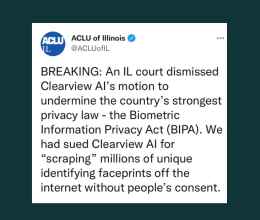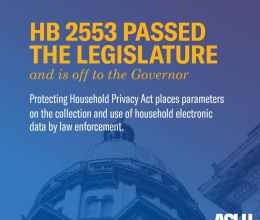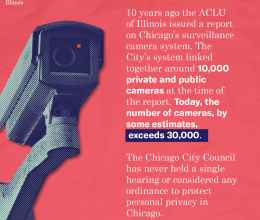
By: Stephen Ragan, Policy and Advocacy Strategist: Privacy, Technology and Surveillance
In a recent blog post, Ring, an Amazon owned company, announced it would stop allowing police departments to request Ring doorbell camera footage from users. This is a welcome announcement, but it should not suggest that an industry that invades our privacy and profits off surveillance is capable of self-regulation. The incentives here are not aligned.
Ring is a smart security device company best known for their video doorbells that record and transmit video straight to user’s phones and to Amazon’s cloud. The company was acquired by Amazon in 2018, and in many neighborhoods today, Ring video doorbells are ubiquitous.
Law enforcement and Ring saw an opportunity and began partnerships across the country. These partnerships reportedly provided access to Ring’s “Law Enforcement Neighborhood Portal,” which allowed law enforcement to view maps where Ring Cameras were located.
These partnerships also gave law enforcement the ability to directly request video from Ring users circumventing the need to get a warrant. While Ring users are not required to give video to police, most people do not know this and why should they? This is not something the company advertises and without strong laws that protect our privacy, we are left in a situation of uncertainty.
The ACLU of Illinois has long called for appropriate limitations on law enforcement’s access to our personal information. This includes advocacy work to get the Protecting Household Privacy Act (PHPA) passed here in the state of Illinois. The PHPA prevents law enforcement’s ability to directly collect and use household electronic data without a court issued warrant. The law was an important step to prevent law enforcement from accessing our sensitive information through a backdoor, without permission from a court.
The PHPA did not stop law enforcement from directly requesting our sensitive data from companies like Amazon. Law enforcement’s ability to directly request data from third parties like Amazon and other data brokers is an intolerable situation that perpetuates an environment of constant surveillance.
While we applaud Amazon’s decision, the partnership between law enforcement and Ring highlights law enforcement’s ability to infringe our privacy by circumventing warrant requirements by requesting or buying access to our private information. This is because the default position in Illinois is that companies can collect our personal information, and the imperative is on us to opt-out of data collection.
This has led some of the biggest companies in the world to accumulate a treasure trove of information about us and where there is hidden treasure, people go looking. This accumulation of data presents an attractive target for hackers and leaves companies internal data security teams scrambling. Year-by-year ransomware attacks in which malware infects a system, encrypts files, and prevents access to data, are on the rise. This puts all of our privacy in jeopardy.
Illinois has led the way with basic privacy protections for users of emerging technologies. We need to continue to pursue new ways to protect privacy without relying on companies to do the right thing on their own.






